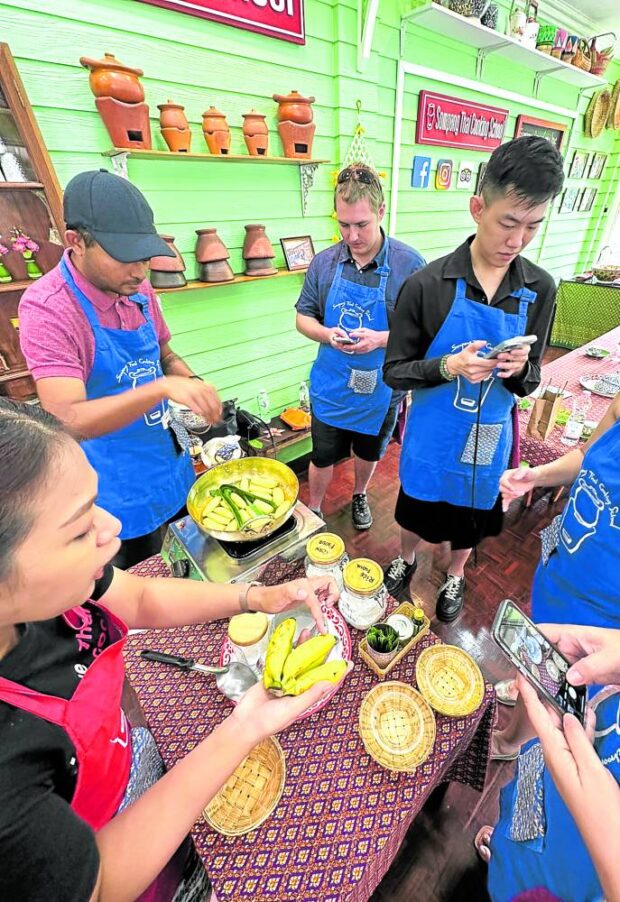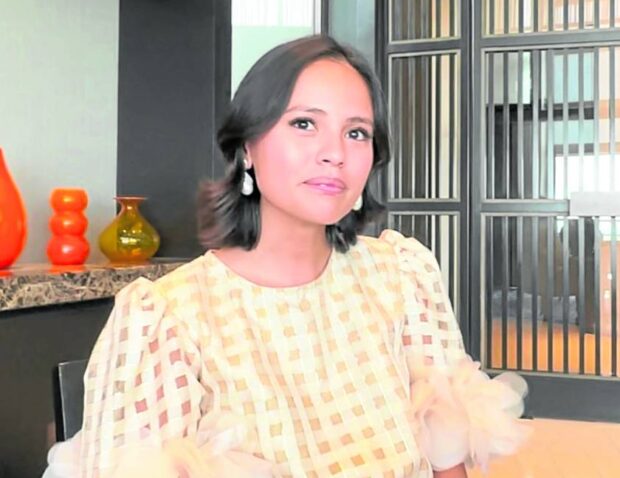Experience is next-generation traveler’s ‘new currency’

WOK TO TABLE Chef Ant (leftmost) teaches foreigners how to cook authentic Thai dessert at Sompong Thai Cooking School in Bangkok. —PHOTOS BY DORIS DUMLAO-ABADILLA
Ant, a petite and energetic 30-something Thai chef, leads a small group of tourists into a wet market not too far from Sompong Thai Cooking School in Bangkok where she works as a teacher. She handpicks fresh ingredients for curry, pad thai (stir-fried noodles), som tam (papaya salad) and sweetened banana.
After explaining each quintessential ingredient, particularly coconut milk and spices, she spends the next three hours teaching authentic Thai cooking. It’s a hands-on experience, with each student cutting, grinding and working with the wok what to eat for lunch.
“Today, I want my salad to be 500 baht,” Ant says in jest, as she demonstrates how to fashion an edible rose out of tomato peels for garnishing.
At the end of the session, each student learns not only how to cook four traditional dishes but picks up tips on how to beautify their plates too.
Even for travelers who have already seen Bangkok’s top attractions, new experiences like culinary tutorials are designed to entice them to go back for more. These days, Thai massage can also be bundled with afternoon tea, like at the popular Divana spa. Visits to the usual temples can be jazzed up by wearing Thai costume.
Experiences have emerged as the new coveted currency, especially for the next generation of travelers, says Asia-Pacific’s leading digital one-stop travel shop Klook, shortened from “keep looking.”
Millennials and Gen Zs, who form the bulk of Klook’s users, pay for meaningful experiences and some even monetize them on social media even if they just have a few thousand followers.
Klook, which pitches itself as an “experience-first” platform, is thus doubling down on curating activities that especially appeal to a global youthful market.
Play or fun (experience), move (transport) and stay (hotel bookings) are three of the big cash buckets of Klook, whose mobile app has been downloaded 30 million times and attracts 63 million monthly visits. It now has 530,000 offerings in 15 languages across more than 2,300 destinations across the world.
For its ninth birthday bash in September, Bangkok is a no-brainer choice for Klook. Thailand is an easy destination to sell, with 15 million inbound or foreign tourists in the first seven months—five times more than the Philippines’—and aims to end the year with 25 million.

Eric Gnock Fah
What’s booming?
Eric Gnock Fah, Klook chief operating officer and cofounder, says in a press briefing that while the company is unlikely to deviate much from its three buckets, there will be a lot more specialized experiential offerings.
For instance, expect Klook to unveil more ski and snowboarding products in winter, especially in Japan, he says. Klook will likewise develop more products related to diving—very relevant in Southeast Asia, which accounts for more than a third of its business. “That’s an area that will go much deeper [into] and try to specialize more: [to be] the platform for diving operators and as well as for divers,” Fah says.
This is to remain competitive in an environment where even hotel and vacation home booking platforms like Agoda and Airbnb, as well as airlines and hotels themselves, are now offering bundled mobility and tour options.
Unlike in Thailand, Klook’s businesses in the Philippines, Malaysia and Indonesia are mostly driven by domestic travelers.
“That’s why we’re trying to come into these three markets around boat tours to help upgrade the service, not only to benefit the domestic travelers but hopefully open the door [and make them] more appealing to inbound travelers,” he says.
Among Asia-Pacific tourists, entertainment is one of the most-sought experiences, says Klook CEO and cofounder Ethan Lin. For Taylor Swift’s blockbuster The Eras Tour, Klook’s inventory was sold out in less than 24 hours.
Klook has also seen a surge in demand for massage and hot springs, especially among travelers from Singapore, Hong Kong, Korea and Japan. Cultural experiences are likewise highly sought, alongside entries to museums and historical sites.
Across all markets, there’s also boom in nature and outdoor activities.
And Klook is riding this revenge travel wave, with annualized sales this year hitting around $3 billion or three times the prepandemic level.

Michelle Ho
PH market
Before the pandemic, the Philippines was Klook’s No.1 market in Southeast Asia and has remained among the top 5 in terms of user base to date.
The app has more than 4 million active users here, primarily in Metro Manila, says Michelle Ho, Klook country manager for the Philippines and Thailand.
Although Klook has expanded “exponentially” since debuting into this market in 2016, Ho says there’s a lot more room to grow, especially outside Metro Manila.
She notes that the biggest demand for Taylor Swift concert tickets came from the Philippines. “It took us by surprise,” says Ho, a Filipina based in Hong Kong.
Klook plans to expand in Pampanga as well as Cebu, Bohol and Dumaguete. It is also looking to offer multi-destination trips.
“There’s really a huge potential. We’re growing our team in the Philippines and we’re really serious about working with the government and private operators in building tourism,” she says.
During its early days, Klook became popular here for Hong Kong Disneyland and Universal Studies Singapore bookings.
These days, Hong Kong, Singapore and Japan are still among Pinoys’ favored overseas destinations, says Ho.
Klook has likewise bulked up its domestic business by listing attractions like Enchanted Kingdom, Manila Ocean Park, Cebu Ocean Park and Anjo World Theme Park (Cebu).
Ho notes that Klook is enabling these providers to reach a global market without them having to develop and run their own online platform.
“Slowly, we branched out to other experiences: island hopping in Palawan, and we also have mobility,” she says, citing Klook’s new hop-on, hop-off service using small shuttles in Boracay, where point-to-point transport is expensive. Klook plans to offer similar one- or two-day passes in Siargao, “one of the destinations with similar behavior as Boracay,” Ho says.
As Pinoys are perennial bargain-hunters, is it worth it for them to use Klook instead of booking directly with the travel suppliers? Ho says yes, especially with the Klook passes at various destinations.
“For Klook pass, the premise is you get it at a deep discount rate. That’s our arrangement with a lot of our operators and we manage to bring in a lot of volume,” she explains.
“Some people think it’s eating up the share of direct or standalone (suppliers) but in fact, we are able to grow a new segment.” She is referring to travelers within the 25 to 38 age range who are heavy consumers and creators of social media content. Klook feels particularly close to this digital-savvy segment.
Earn from doing what you love
Klook is betting on the continued rise of social travel with the launch of Klook Kreators, a pioneering influencer affiliate program with social media at its core. Kicking off its ninth birthday festivities this September, the travel tech unicorn is investing more in digital creators to power its online sales campaign. Instead of the company itself doing so, it wants to let users share their personal experiences. Such authenticity is seen to be more effective and Klook wants to share the spoils with its promo code-brandishing army of creators who are travel enthusiasts.
The platform has enlisted about 1,000 influencers ranging from nano (with less than 1,000 followers) to macro (with at least 100,000 followers) influencer scale in a pioneering affiliate program.
“We’re seeing a seismic shift in how these next-gen travelers discover and get inspired for travel. We understand that the next-gen travelers thrive on experiences that are immersive and shareable. That’s why we’re placing our bets on digital creators to shape how our next-gen travelers discover and plan their holidays. This entails delving deep into the world of user-generated content that’s designed to be mobile, bite-sized and shareable—everything that fuels their wanderlust and enriches their journey,” says Fah.